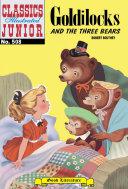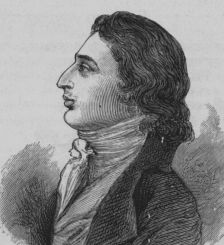Works

Goldilocks and the Three Bears
Robert SoutheyThe Inchcape Rock
Robert SoutheyFamous Robert Southey Quotes
"The Story of the Three Bears", The Doctor http://www.edsanders.com/stories/3bears/3bears.htm (1837).
St. 4.
The Cataract of Lodore http://www.cs.rice.edu/~ssiyer/minstrels/poems/652.html (1820)
Robert Southey Quotes about time
“Where Washington hath left
His awful memory
A light for after times!”
Ode written during the War with America (1814).
Canto X, st. 10.
The Curse of Kehama (1810)
'On the Corn-Laws', The Quarterly Review, Vol. LI. (March & June 1834), p. 231
1830s
Robert Southey: Trending quotes
St. 33.
The Devil's Walk http://www.rc.umd.edu/editions/shelley/devil/devil.rs1860.html (1799)
St. 8.
The Cataract of Lodore http://www.cs.rice.edu/~ssiyer/minstrels/poems/652.html (1820)
St. 1.
The Battle of Blenheim http://www.poetry-archive.com/s/the_battle_of_blenheim.html (1798)
Robert Southey Quotes
St. 11.
The Battle of Blenheim http://www.poetry-archive.com/s/the_battle_of_blenheim.html (1798)
“What will not woman, gentle woman dare,
When strong affection stirs her spirit up?”
Madoc in Wales, Part II, 2 (1805).
St. 2.
The Cataract of Lodore http://www.cs.rice.edu/~ssiyer/minstrels/poems/652.html (1820)
“In my days of youth, I remembered my God,
And he hath not forgotten my age.”
The Old Man's Comforts and How He Gained Them, st. 6.
“Cold is thy heart and as frozen as Charity!”
The Soldier's Wife http://www.lib.utexas.edu/epoetry/southeyr.q3c/southeyr.q3c-95.html, l. 11 (1795).
For the apartment in Chepstow Castle where Henry Marten the Regicide was imprisoned thirty years.
“He came to ask what he had found,
That was so large, and smooth, and round.”
St. 2.
The Battle of Blenheim http://www.poetry-archive.com/s/the_battle_of_blenheim.html (1798)
“How does the water
Come down at Lodore?”
St. 1.
The Cataract of Lodore http://www.cs.rice.edu/~ssiyer/minstrels/poems/652.html (1820)
“Literature cannot be the business of a woman's life, and it ought not to be.”
Letter to Charlotte Brontë in March 1837, reported in Gaskell The life of Charlotte Brontë, Vol. I (1857), p. 139, and in Mumby Letters of Literary Men, Vol. II (1906), p. 185.
“The arts babblative and scribblative.”
Colloquies on the Progress and Prospects of Society, No. 1, pt. 2 (1829).
“Yet leaving here a name, I trust,
That will not perish in the dust.”
My Days Among the Dead Are Past, st. 4.
Thalaba the Destroyer http://www.litgothic.com/Texts/thalaba_frag.html, Bk. I, st. 1 (1800).
“And then they knew the perilous Rock,
And blest the Abbot of Aberbrothok.”
The Inchcape Rock http://www.poemhunter.com/p/m/poem.asp?poet=6688&poem=28859, st. 4 (1802).
“Curses are like young chickens, they always come home to roost.”
Motto.
The Curse of Kehama (1810)
The Old Man's Comforts and How He Gained Them http://www.poetsgraves.co.uk/Classic%20Poems/Southey/the_old_man's_comforts.htm, st. 1 (1799).
Letter to Charlotte Brontë in March 1837; Gaskell The life of Charlotte Brontë, Vol. I (1857), p. 140.
“Thou hast been called, O sleep! the friend of woe;
But ’tis the happy that have called thee so.”
Canto XV, st. 11.
The Curse of Kehama (1810)
St. 2.
The Cataract of Lodore http://www.cs.rice.edu/~ssiyer/minstrels/poems/652.html (1820)
St. 8. Compare: "And the Devil did grin, for his darling sin / Is pride that apes humility", Samuel Taylor Coleridge, The Devil's Thoughts.
The Devil's Walk http://www.rc.umd.edu/editions/shelley/devil/devil.rs1860.html (1799)
“The laws are with us, and God on our side.”
On the Rise and Progress of Popular Disaffection, Essay viii, Vol. ii (1817).
St. 31.
The Devil's Walk http://www.rc.umd.edu/editions/shelley/devil/devil.rs1860.html (1799)
“'Tis some poor fellow's skull," said he,
"Who fell in the great victory.”
St. 3.
The Battle of Blenheim http://www.poetry-archive.com/s/the_battle_of_blenheim.html (1798)
Quoted in A Dictionary of Thoughts: Being a Cyclopedia of Laconic Quotations from the Best Authors of the World, Both Ancient and Modern, ed. Tryon Edwards, F. B. Dickerson Company (1908), p. 52
Madoc in Wales http://olivercowdery.com/texts/1805sout.htm#pg001, Part I, Sec. V - 48 (1805). Compare: "'Darkly, deeply, beautifully blue,' As some one somewhere sings about the sky", Lord Byron, Don Juan, canto iv. stanza 110.
St. 25.
The Devil's Walk http://www.rc.umd.edu/editions/shelley/devil/devil.rs1860.html (1799)
“But what they fought each other for
I could not well make out.”
St. 6.
The Battle of Blenheim http://www.poetry-archive.com/s/the_battle_of_blenheim.html (1798)
St. 1.
The Devil's Walk http://www.rc.umd.edu/editions/shelley/devil/devil.rs1860.html (1799)
“So I told them in rhyme,
For of rhymes I had store.”
St. 1.
The Cataract of Lodore http://www.cs.rice.edu/~ssiyer/minstrels/poems/652.html (1820)
My Days Among the Dead Are Past http://rpo.library.utoronto.ca/poem/1957.html, st. 1 (1818).
St. 3.
The Devil's Walk http://www.rc.umd.edu/editions/shelley/devil/devil.rs1860.html (1799)
Letter http://books.google.com/books?id=LUFjAAAAcAAJ&q=%22every+body+is+a+critic%22&pg=PA277#v=onepage to Robert Rickman (30 May 1804)
Colloquies on the Progress and Prospects of Society, No. 1, pt. 14. Compare: "The march of the human mind is slow", Edmund Burke, Speech on the Conciliation of America, Vol. ii., p. 149.
